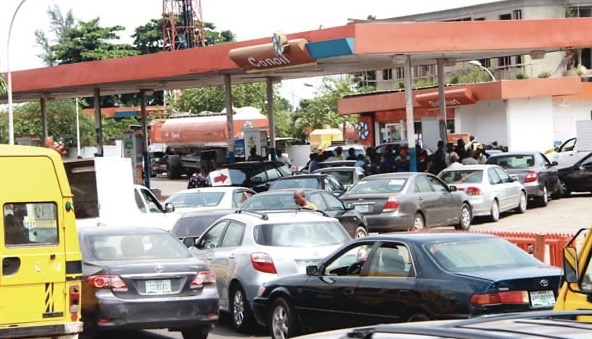KEY POINTS
- Fuel queues reappeared in Lagos and Abuja as some stations suspended sales and rejected POS payments.
- Dispute between Dangote Refinery and PENGASSAN triggered supply disruptions after union halted crude and gas deliveries.
- Government mediation led to suspension of the strike, but shortages already hit major cities.
Fuel queues have returned to Nigeria’s biggest cities, Lagos and Abuja, ending months of relative stability in the country’s volatile downstream market. Motorists spent hours searching for petrol on Wednesday, after several filling stations stopped sales or rejected electronic payments, deepening concerns that a broader supply squeeze may be in play.
By midday in Lagos, fuel queues stretched along major roads as some NNPC and Bovas outlets that dispensed fuel in the morning abruptly shut down by early afternoon. Commuters vented their frustration on social media. One resident described visiting four different stations before finally finding fuel—only to discover that sales had already been suspended.
In Abuja, similar scenes unfolded. Videos and photos shared online showed long lines snaking out of TotalEnergies and AP filling stations, with drivers lamenting that queues had returned just weeks after Nigerians had begun to enjoy smoother supplies following Dangote Refinery’s long-awaited entry into the local market.
Dispute Between Dangote and Oil Workers Union Sparks Disruptions
The shortages stem from an escalating dispute between Dangote Petroleum Refinery and the Petroleum and Natural Gas Senior Staff Association of Nigeria (PENGASSAN). The union accused the refinery of unfair treatment of staff seeking to unionize and last week directed members to halt gas and crude deliveries to the plant.
Dangote Group rejected the allegations, saying only a handful of employees had been affected by a reorganization aimed at safeguarding operations. The company branded the union’s strike call “unlawful and disruptive,” warning it could choke production and distribution of petrol, diesel, aviation fuel, kerosene, and cooking gas nationwide.
The federal government has since stepped in, brokering a truce after two days of talks in Abuja. PENGASSAN said it would suspend its nationwide strike, but the damage was already rippling through supply chains, with retail shortages hitting major cities almost immediately.
For many Nigerians, the sudden scarcity has revived painful memories of the long queues and cash-only policies that accompanied past crises in the country’s oil sector. “Pengassan e da kun o,” one Lagos commuter wrote online, appealing to the union to reconsider its hard line.
Whether the truce will hold—and how quickly fuel flows normalize—will determine how deep the disruption cuts into daily life in Africa’s largest oil producer.



